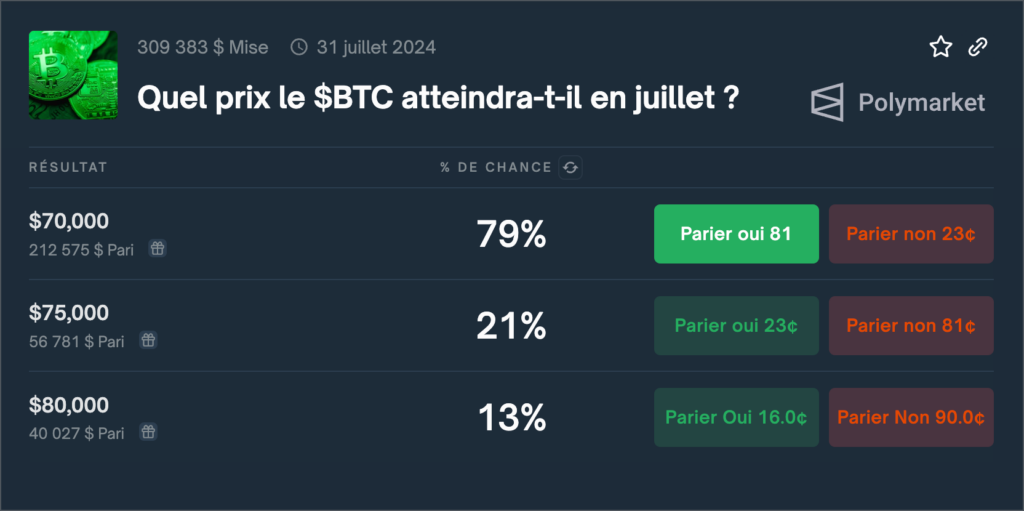If we analyze the latest bitcoin ETF data, it appears that the coming weeks look bright for bitcoin. After a gloomy June, particularly following Germany’s sale of 50,000 BTC, can we expect a new bull run to reach $80,000 by the fall?

Dynamic Bitcoin ETFs in July
The Bitcoin ETFs recorded positive net inflows every day in July, except for once on July 3rd, when minor outflows of 200 BTC were recorded.
This trend indicates a renewed dynamism in the market after a lackluster performance in June. More recently, July 16 saw a substantial influx of 6,500 BTC, up from the strong performance of the previous day, which saw an influx of 4,700 BTC.
The inflows over these two days alone highlight the growing interest and confidence in Bitcoin ETFs. The data clearly shows strong buying momentum.
Regular inflows throughout July indicate sustained investor confidence despite a significant Bitcoin sale by the German government.
Towards a new Bitcoin bull run?
This consistency is a positive indicator of market sentiment and suggests that the market is recovering from June’s mediocre performance.


The continuous inflow of money into Bitcoin ETFs can have several causes:
- June’s poor performance seems to be an anomaly, with July’s strong inflows reflecting a recovery and a renewed interest in buying BTC.
- Large inflows are often a sign of institutional participation, suggesting that larger and more strategic investors are increasing their exposure to bitcoin through ETFs.
The inflows contribute to greater liquidity and market stability, which can attract more investors and support the growth of the bitcoin market.
Blackrock very bullish on bitcoin
On Monday, July 15, Blackrock CEO Larry Fink appeared on CNBC to state that he now had a favorable view of bitcoin, changing his previous opinion that it was not an appropriate investment instrument.
The IBIT, Blackrock’s Bitcoin ETF, has seen the largest fund inflows of all ETFs and holds over 320,000 BTC.
The recent BTC decline caused by Germany
Germany started selling 50,000 bitcoins confiscated during the shutdown of an illegal music-sharing service.
This decision marks one of the largest disposals of seized digital currency, sparking intrigue and debates within the global bitcoin community.
The bitcoins were seized from an illegal file-sharing operation known as movie2k, which facilitated access to pirated movies and TV shows. The success of the German authorities in this operation was hailed as a victory against digital piracy and money laundering.
The seizure, which involved numerous law enforcement agencies, including the Federal Criminal Police Office and the FBI, is noteworthy for its scale.
A significant symbol
The sale of these confiscated bitcoins is not just a bureaucratic measure; it is also a statement about the role of Bitcoin in the modern financial landscape.
By choosing to sell the bitcoins rather than keep them, German authorities acknowledge that Bitcoin is a valuable asset, akin to gold or foreign currency reserves.
This decision could set a precedent for other governments managing seized digital assets and could influence how nations approach crypto.
With its fixed supply of 21 million tokens, bitcoin offers a stark contrast to fiat currencies, which central banks can print at will.
This fixed supply is a key feature that appeals to investors looking for protection against inflation and currency devaluation, especially in the current economic climate where fiat currencies face unprecedented pressures.
The market impact of bitcoin sales
The sale of 50,000 bitcoins on the market is not without consequences.
Such a significant sale appears to have had a negative impact in June on the price of bitcoin.
However, historical precedents suggest that the market can absorb large sales without long-term negative effects.
The future of bitcoin
Germany’s decision also raises important questions about the role of cryptos in the state’s economy. As more assets transition to digital formats, methods and policies for managing these assets must evolve.
For bitcoin enthusiasts and digital currency advocates, Germany’s decision validates bitcoin’s place in the global financial system.
It suggests that bitcoin is not just a speculative asset but a legitimate store of value and medium of exchange with which governments must contend.
The successful absorption of such a volume of bitcoins into the market also demonstrates the robustness of bitcoin’s liquidity and its ability to handle large transactions without long-term negative effects.
It is becoming increasingly clear that bitcoin’s role in the global financial landscape is evolving: governments are now participating in market dynamics, and institutions are flocking to ETFs. This evolution marks a significant step in integrating BTC into traditional economic frameworks, heralding a new era of financial innovation.
Maximize your Cointribune experience with our ‘Read to Earn’ program! Earn points for each article you read and gain access to exclusive rewards. Sign up now and start accruing benefits.
Click here to join ‘Read to Earn’ and turn your passion for crypto into rewards!
Chaque jour, j’essaie d’enrichir mes connaissances sur cette révolution qui permettra à l’humanité d’avancer dans sa conquête de liberté.
DISCLAIMER
The views, thoughts, and opinions expressed in this article belong solely to the author, and should not be taken as investment advice. Do your own research before taking any investment decisions.




